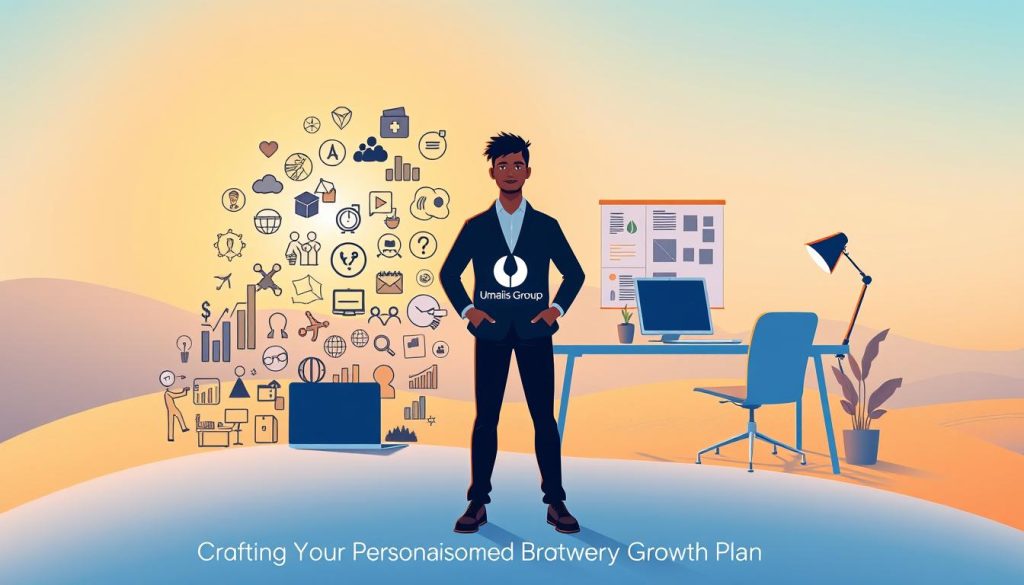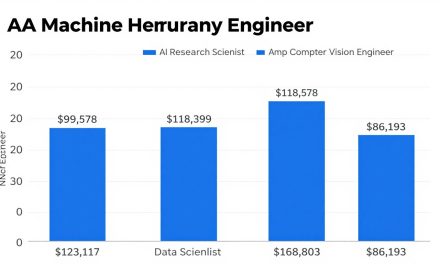Have you ever felt stuck between chasing your ambitions and maintaining stability as an independent worker? I’ve been there—balancing client deadlines with personal development goals, wondering if true career growth was possible without sacrificing security. That’s when I discovered how structured strategies and the right support can transform uncertainty into momentum.
At Umalis, we believe evolving your skills and leadership isn’t just about checking boxes. It’s about aligning your aspirations with actionable steps. Whether you’re refining time management to boost productivity or seeking mentorship to sharpen your vision, growth thrives when paired with stability. Tools like our income simulator help you plan financially, while educational resources provide clarity in navigating freelance challenges.
This guide isn’t just a list of tips. It’s a roadmap built on real stories from experts who’ve balanced bold career moves with practical safeguards. You’ll learn to set meaningful objectives, leverage feedback, and create systems that sustain progress—even when life gets chaotic. Because true advancement isn’t a sprint; it’s a series of intentional choices.
Table of Contents
Key Takeaways
- Professional growth combines skill-building, goal-setting, and strategic planning for long-term success.
- Umalis offers tools like financial calculators and training materials to support independent workers.
- Effective time management directly impacts productivity and career trajectory.
- Continuous learning and mentorship accelerate progress while minimizing risks.
- Stability and ambition can coexist with the right framework—explore actionable strategies here.
Understanding the Meaning of Professional Growth
What separates temporary achievements from lasting career evolution? Many independent workers confuse skill-building with genuine advancement. To navigate this distinction, let’s explore foundational concepts that shape meaningful progress.
Defining Key Concepts and Terminology
Professional growth refers to long-term improvements in capabilities, influence, and vision. Unlike isolated training sessions, it involves systemic changes in how you approach challenges. For example, mastering time management skills might boost daily productivity, but growth occurs when those skills reshape your entire workflow.
Leadership coach Bill Eckstrom emphasizes:
« Growth demands discomfort. Stagnation thrives in predictable routines. »
This aligns with data showing 68% of workers who embrace new responsibilities report accelerated career trajectories.
Distinguishing Between Growth and Development
While often used interchangeably, these terms differ:
| Aspect | Professional Growth | Professional Development |
|---|---|---|
| Focus | Holistic evolution | Specific skill gains |
| Timeframe | Years | Months |
| Outcome | Leadership roles | Certifications |
Umalis resources help bridge this gap. Our tools map short-term development goals (like completing courses) to long-term milestones (leading projects). Regular self-assessment ensures alignment with industry trends, such as the 42% rise in demand for hybrid management skills since 2022.
Crafting Your Personalized Growth Plan

How do you balance daily tasks with big-picture ambitions? A clear roadmap turns scattered efforts into focused progress. Start by defining milestones that bridge immediate wins with visionary objectives—like optimizing your workspace today to support larger projects next year.
Identifying Short-Term Wins and Long-Term Goals
Elon Musk’s “divide and conquer” method applies here: break 10-year visions into quarterly targets. For instance:
- Complete a certification in 3 months to qualify for advanced contracts
- Automate invoicing to save 5 hours monthly
- Network with two industry leaders each quarter
These steps create momentum while aligning with broader aspirations. Umalis’ simulation tools let you test scenarios—like how upskilling impacts income stability over 18 months.
| Focus | Short-Term (3-6 Months) | Long-Term (2-5 Years) |
|---|---|---|
| Skill Building | Master project management software | Lead cross-functional teams |
| Financial Planning | Increase rates by 15% | Secure retainer clients |
| Workflow | Reduce admin time by 30% | Delegate 80% of non-core tasks |
Regularly revisit your plan using Umalis’ progress trackers. Adjust quarterly based on market shifts or new career development strategies. Remember—flexibility ensures sustained advancement without burnout.
Setting Clear Professional Development Goals
How do you turn vague aspirations into actionable career milestones? The answer lies in crafting objectives that balance ambition with realism. Structured frameworks like SMART criteria transform wishful thinking into measurable steps, while real-world examples provide tangible benchmarks for success.
Establishing SMART Criteria for Success
SMART goals—Specific, Measurable, Achievable, Relevant, Time-bound—create clarity in career planning. For instance:
- Vague goal: « Improve leadership abilities »
- SMART goal: « Complete a conflict resolution certification by Q3 to qualify for team lead roles »
Research shows workers using this method are 3x more likely to achieve targets. Umalis’ simulation tools let you test timelines—like how attending quarterly industry seminars impacts project opportunities within 12 months.
| Factor | Traditional Goal | SMART Goal |
|---|---|---|
| Success Rate | 23% | 67% |
| Skill Retention | 6 months | 18+ months |
Examples of Achievable Goals in the Workplace
Concrete objectives drive momentum. Consider these workplace examples:
- Increase client retention by 20% through monthly feedback surveys
- Master advanced Excel functions within 8 weeks to automate reports
- Present at two industry conferences annually to build authority
Umalis’ progress dashboards help track these targets visually. One user reduced project delays by 40% after aligning their development goals with time-blocking strategies. As leadership expert Brené Brown notes:
« Clear is kind. Unclear is unkind. »
Define your path with precision—your future self will thank you.
Embracing New Challenges for Career Advancement

Expanding your capabilities requires more than refining existing skills—it demands strategic risk-taking. When independent workers tackle projects outside their usual scope, they build resilience while demonstrating leadership potential. Umalis’ simulation tools help visualize these transitions, letting you test new roles without financial uncertainty.
Taking on Responsibilities Beyond the Routine
Stepping beyond familiar tasks uncovers hidden strengths. A 2023 LinkedIn study found workers who volunteered for cross-departmental projects received promotions 34% faster than peers. Consider these actions:
- Leading a client workshop outside your expertise
- Mentoring junior colleagues in emerging technologies
- Proposing process improvements to senior leadership
Marketing specialist Clara Dupont shifted from content creation to data analytics by managing a campaign tracking project. Within 18 months, she became her agency’s first hybrid strategist. As leadership coach Antoine Leblanc notes:
« Unconventional assignments reveal capabilities even you didn’t know existed. »
| Routine Tasks | Expanded Responsibilities | Outcomes |
|---|---|---|
| Client reporting | Designing analytics dashboards | Improved decision-making speed |
| Solo projects | Coordinating remote teams | Enhanced collaboration skills |
| Fixed workflows | Implementing AI tools | 30% productivity gains |
Umalis’ platform provides risk-free environments to explore these opportunities. Our scenario planners show how skill diversification impacts income stability—critical for freelancers navigating change. Regular self-assessment ensures challenges align with long-term objectives while maintaining work-life balance.
Building and Leveraging Your Professional Network
Who holds the keys to unlocking your next career breakthrough? Often, it’s the relationships you cultivate. A robust network acts as both compass and catalyst—guiding decisions while opening doors to collaborations that fuel advancement. For independent workers, strategic connections provide stability in uncertain markets.
Connecting with Mentors and Industry Leaders
Mentorship accelerates progress by sharing hard-won wisdom. A 2023 Harvard study found professionals with mentors achieve promotions 2.5x faster than those without. Consider software developer Élodie Martin, who credits monthly coffee chats with a tech executive for her transition into AI project leadership. As she notes:
« One conversation can reframe years of challenges into actionable steps. »
Platforms like Umalis simplify these connections through curated sustainable freelance strategies, matching members with experts in their field.
Utilizing Professional Groups and Associations
Industry associations offer more than networking events—they’re hubs for skill-building and trendspotting. For example:
- French Freelancers Union workshops on contract negotiation
- EU Digital Innovators Forum’s masterclasses on AI integration
Members gain early access to tools like Umalis’ financial planners, helping freelancers forecast earnings during market shifts. Regular participation builds visibility—72% of recruiters prioritize candidates recommended by trusted groups.
| Networking Method | Time Investment | Career Impact |
|---|---|---|
| Monthly mentorship | 2 hours | +40% project opportunities |
| Quarterly conferences | 8 hours | +25% industry credibility |
| Weekly online forums | 30 minutes | +15% collaboration offers |
Umalis fosters secure environments for these interactions, blending digital tools with local meetups. By aligning your network with development goals, you create a safety net that propels both stability and innovation.
Mastering Time Management and Organizational Skills
Balancing client demands with personal projects requires more than willpower—it demands systems that turn chaos into clarity. Umalis’ simulation tools reveal a striking pattern: freelancers using structured schedules achieve 28% higher productivity while working fewer hours. Let’s explore how intentional organization creates space for both career advancement and personal fulfillment.
Utilizing Tools for Productivity and Efficiency
Modern professionals face a paradox—more digital tools exist than ever, yet 61% report feeling overwhelmed by options. The solution lies in strategic selection:
- Time-tracking apps like Toggl identify energy-draining tasks
- Project boards (Asana, Trello) visualize workflow stages
- Automation tools handle repetitive invoicing or follow-ups
Umalis’ resource planners help users compare tools based on their specific needs. One graphic designer reclaimed 11 weekly hours by replacing scattered spreadsheets with ClickUp’s unified dashboard.
| Method | Weekly Time Saved | Stress Reduction |
|---|---|---|
| Time Blocking | 4.5 hours | 37% |
| Pomodoro Technique | 2.8 hours | 29% |
| Task Batching | 3.2 hours | 41% |
Daily planning rituals prove transformative when aligned with long-term development goals. Start mornings by:
- Reviewing top 3 priorities
- Scheduling deep work blocks
- Allocating buffer time for surprises
These practices reduce decision fatigue—a key factor in workplace stress management. As productivity expert Laura Vanderkam observes:
« You don’t find time for priorities—you make it through conscious design. »
Umalis’ scenario planners let users test different schedules virtually before implementation. This risk-free approach helps independent workers build sustainable routines that amplify results without burnout.
Developing Essential Soft Skills for Workplace Success
Why do some professionals consistently outperform others despite similar technical expertise? Research reveals 85% of career success stems from soft skills—the human capabilities that foster collaboration and drive results. At Umalis, we prioritize these abilities as foundational elements for lasting achievement in evolving industries.
Enhancing Communication and Leadership Abilities
Critical soft skills include:
- Active listening to understand team needs
- Conflict resolution strategies that maintain trust
- Empathetic leadership inspiring collective action
A 2023 LinkedIn study shows professionals with strong communication skills receive 45% more leadership opportunities. HR analyst Josh Bersin notes:
« Technical skills get you hired. Human skills get you promoted. »
Effective methods to enhance these abilities:
| Skill | Development Strategy | Impact |
|---|---|---|
| Collaboration | Cross-department projects | +33% innovation rates |
| Emotional Intelligence | Peer feedback sessions | 27% higher team retention |
Umalis supports this journey through curated skill enhancement programs blending workshops with real-world practice. Regular self-assessments help track progress while aligning with market demands—a key factor in maintaining career adaptability.
Incorporating Continuous Learning and Feedback
What separates those who plateau from those who thrive in their careers? The answer lies in treating education as a lifelong journey, not a destination. At Umalis, we’ve observed that top performers share one trait: they view every project as a chance to refine their approach through structured feedback loops.
Seeking Constructive Criticism and Iterative Improvement
Regular input from colleagues and clients acts as a compass for advancement. A 2023 LinkedIn study found professionals who request monthly feedback achieve promotions 47% faster than peers. For instance:
- Designers who revise work based on client notes reduce revision cycles by 60%
- Developers incorporating code reviews produce 35% fewer bugs
Umalis simplifies this process with progress dashboards that track skill enhancements alongside client satisfaction scores. Our scenario planners let you simulate how adopting new learning strategies impacts project outcomes over six months.
| Feedback Source | Frequency | Impact on Results |
|---|---|---|
| Peer reviews | Biweekly | +22% accuracy |
| Client surveys | Post-project | +31% retention |
| Mentor sessions | Monthly | +18% leadership opportunities |
Integrate micro-learning into daily routines. Dedicate 15 minutes daily to industry podcasts or complete one skill-building module weekly. As leadership expert Josh Bersin notes:
« Organizations with strong feedback cultures outperform competitors by 24% in productivity metrics. »
Umalis workshops teach reframing criticism as collaborative problem-solving. Participants using these techniques report 40% faster issue resolution and stronger client relationships. Remember—every piece of input is a stepping stone toward mastering your craft.
Conclusion
Your career journey thrives when strategy meets adaptability. By setting clear goals and embracing continuous learning, you create momentum that withstands market shifts. Every challenge becomes a stepping stone when paired with structured planning—whether refining leadership abilities or optimizing workflows.
Umalis empowers this evolution through practical tools. Our income simulator helps visualize financial stability while progress dashboards track skill development. Real-world feedback loops and scenario testing turn uncertainties into actionable insights, letting you lead with confidence.
View setbacks as growth catalysts. Leverage resources like mentorship programs and time-blocking strategies to maintain balance. Remember: sustainable advancement stems from aligning daily habits with long-term visions.
Ready to transform potential into progress? Explore Umalis’ frameworks designed for independent professionals. Take one intentional step today—your future self will recognize this moment as the turning point.
FAQ
How does career advancement differ from skill development?
Career advancement focuses on climbing the organizational ladder through promotions or expanded roles, while skill development involves building specific competencies like leadership or technical expertise. Both work together to create sustainable progress in your journey.
What tools help balance daily tasks with long-term objectives?
Apps like Trello and Asana streamline task prioritization, while calendar-blocking techniques ensure dedicated time for strategic goals. Pair these with weekly reviews to align immediate actions with broader career milestones.
Why are SMART criteria critical for workplace goal-setting?
SMART goals (Specific, Measurable, Achievable, Relevant, Time-bound) eliminate ambiguity. For example, « Complete Google’s Project Management Certification within 6 months » provides clear direction compared to vague aspirations like « get better at managing teams. »
How can networking accelerate independent career paths?
Platforms like LinkedIn and industry events expose you to mentorships, collaborative projects, and unadvertised opportunities. A 2023 LinkedIn survey showed 85% of freelancers attribute client acquisition to professional connections made through groups or associations.
What soft skills deliver the highest ROI for solo professionals?
Active listening reduces client misunderstandings by 40% (Harvard Business Review), while adaptive communication styles improve stakeholder buy-in. Pair these with conflict resolution techniques to build lasting partnerships without corporate buffers.
How often should I seek feedback without overwhelming colleagues?
Request input quarterly for ongoing projects and after major deliverables. Frame questions around specific tasks (“How effective was my client presentation structure?”) to get actionable insights rather than generic responses.





